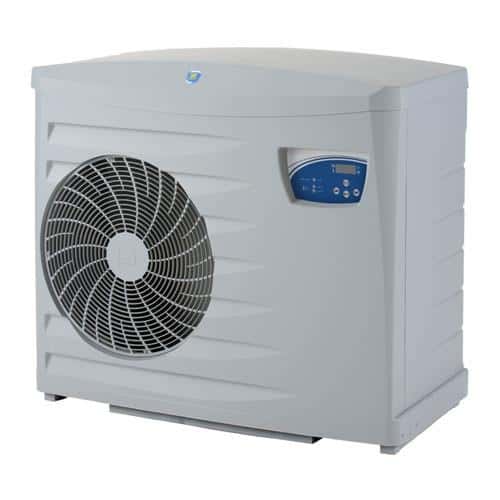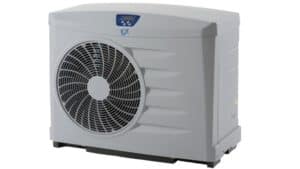
10 Dec Heat pump for your pool, how does it work?
What are pool heat pumps?
Heat pumps serve as a great, popular way to warm-up your pool and reduce heating costs. Heat pumps are installed just as easily as other pool heaters. Also, advanced controls make operating the heat pump simpler than ever. Overall, the heat pump will significantly reduce your operating cost and extend your pool season without breaking the bank.
The device extracts the heat from the air, intensifies it with a compressor, and delivers the new heat to the water as it flows through the system. The process is clean, efficient and most importantly cost effective. On average the electric pump operates at about 25% of the cost of the typical natural gas heater. The heat pump maintains a constant, increased temperature for the pool at a decreased cost, but it is not made for quick heating.
A gas heater usually raises the temperature of the pool 1 degree per hour. An electric pump might take 3 to 5 times longer depending on the outside temperature. If the pump is installed as the primary heat source, with a natural gas heater included as a backup, all of your needs will be accounted for. With a spa attached to the pool, for example, the natural gas heater will raise the spa to its desired temperature in a short period. In general, a heat pump would save the expensive natural gas heater for the emergency, secondary use.
By installing both devices in the heating system, you could run the cost-efficient pump constantly and only use the natural gas system when you want to raise the temperature after extended poor weather, before using the spa, or in preparation of a late-night, outdoor gathering. What are the actual costs associated with this product? Let’s look at the additional costs for this heating option and determine the time it will take to get a return on your investment.

Whats the average cost?
For a +120,000 BTU heat pump, the minimal plumbing and wiring for installation could cost from $4500 to $6500 depending on the manufacturer. A 900 sq. Ft. pool with a spa and waterfall that uses a natural gas heating system has an operating cost that ranges from $800 to $1200 a month depending on usage and weather conditions.
Operating the same pool with an electric heat pump system would cost about $250 to $450 per month. If you add in the operating cost of the backup gas heater, which would be $100 to $300 per month (depending on outside temperatures and usage habits), the average consumer could expect a $400 to $450 per month savings and would recover the initial cost of the heat pump in 2.5 to 4.5 years.
Finally, pool owners can rest assured knowing that going green will save them green!
The difference
Pool heaters are the type of heating system found in most privately owned swimming pools. These heaters have been around for many years and are typically powered by natural gas or propane fuel. As such, these gas heaters require either a hook-up to a natural gas line or a storage tank for storing propane gas. In order to heat pool water, gas pool heaters burn the fuel in a combustion chamber and the heat is then transmitted into the pool water, raising its temperature.
Swimming pool heat pumps, on the other hand, heat water in a different way. The actual pump unit is electrically powered and extracts heat from the air, which has been warmed by the sun and upgrades it with a compressor before transferring it into the pool water. Pool heat pumps will function even when the sun isn’t shining as long as the temperature of the surrounding air is at least 45 degrees Fahrenheit. Pool heaters provide the fastest method of heating swimming pools and are best for heating pools for short periods of time.
For example, if you only use your pool on weekends or often find yourself needing to heat your pool quickly before guests or visitors arrive, a gas pool heater will provide you with the fast and effective performance that you need. Gas pool heaters are also a great option for pool owners who like to swim regardless of the state of the weather, as they can easily and effectively maintain any water temperature. As for pool heat pumps, this type of heating system is also effective regardless of the weather.
However, as already mentioned, this only remains true as long as the air temperature is above 7.2 degrees Celcius. Heat pumps can easily maintain water temperatures in the range of 26 to 32 degrees Celcius and are ideal for homeowners who would like to make use of hot air energy but are unable to make use of solar heaters due to the structure of their roof or other factors. Pool heat pumps are the preferred heating option among athletic trainers and those who use pools for therapy.
Recommended pool heat pumps
We recommend the Hayward and Zodiac heat pump ranges as they are really reliable and great for Australia pools.


